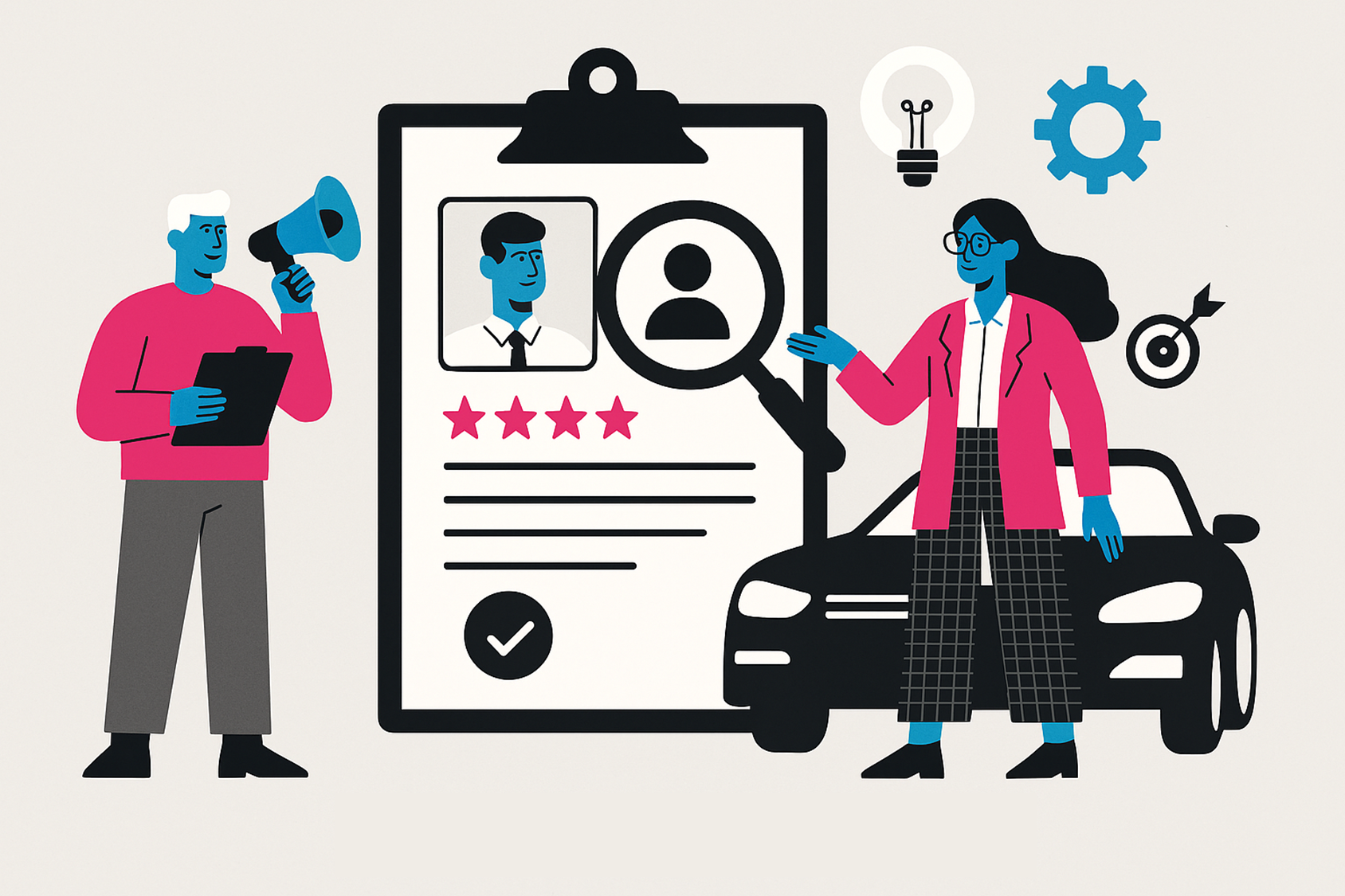In a rapidly evolving market, how can dealer teams evolve to be future ready?
The automotive retail world is changing fast. It’s not only about electrification. It’s software-defined vehicles, AI-driven tools and insights, new entrants rewriting the purchase experience, and customers who expect the same effortless service they get from leading tech brands and premium hotels.
The question is not whether change is coming, it’s whether dealer teams are ready to thrive in it.
What needs to happen now.
To thrive, your business must grow and develop the talent it needs for tomorrow, not just today. That means building future-ready capabilities across every role.
Step 1. Map tomorrow’s roles and skills and make them real
Publish a simple role map that shows where the team is heading and what future skills are needed by your business. Then identify how team members develop relevant skills over time and how they prepare themselves for career success such as management positions.
Tie each step to the customer journey, the metrics that matter, and the required skills. Use market evidence on digital conversion, connected services, and EV complexity to prioritise where to start.
Step 2. Make learning continuous, visible, and aspirational
Learning should feel like progress, not punishment.
Adopt a blended approach where most learning happens on the job, supported by coaching and targeted formal modules.
Use gamification, celebrate milestones publicly, and link learning success to a visible role step and pay band.
Make it aspirational: show that learning leads to career growth.
Step 3. Manage the change, not just the training
People don’t fear change when they feel prepared and informed.
Build comfort with ongoing change through transparent communication, manager coaching skills, and small, frequent releases rather than big-bang launches.
Use simple dashboards that leaders review, with KPIs that drive the right behaviours: customer experience, enquiry to test-drive conversion, time to competence, EV certification and advocacy, waiting times, and subscription activation.
Continuous feedback builds confidence and accelerates adoption.
Why Change?
These steps are essential because the retail landscape itself is transforming.
Journeys now span clicks and bricks. When customers can choose to progress key steps online and finish in-store, conversion improves and haggling reduces. Digital convenience sets the pace, and human moments deliver reassurance and delight.
At the same time, electric vehicles with over-the-air capability require fewer workshop visits, forcing aftersales teams to retain customers longer or pursue new revenue streams. These shifts don’t remove the need for great people; they raise the bar on what great looks like.
Electrification remains a central thread, but adoption is uneven across Europe. Education and advocacy are key to overcoming concerns about upfront cost, range, charging time, and infrastructure. That means product expertise, charging experience, and clear, jargon-free, passionate communication are the required skills.
What future-ready teams look like
So, what should you consider to ensure your people are ready for this change?
Digital fluency with human empathy
Sales consultants must act as omnichannel guides, helping customers to navigate their online-to-showroom transition in line with their requirements, keeping momentum through finance and PX steps, and building trust. They also need to look beyond the vehicle sale to lifetime value, operating as Customer Success Managers for connected services: activating trials, managing renewals, and empowering customers to get the most from their tech.
Technical depth for EV and ADAS
High-voltage technicians, battery diagnostics specialists, and ADAS (advanced driving assistance systems) calibration experts become the backbone of aftersales. Workshops still service vehicles, but repairs shift toward complex, safety-critical work. Clear pathways for your team to these skills are vital given the EV technician shortfall across Europe.
Proactive, data-enabled service
Teams use customer and vehicle data to personalise communications, prevent issues, reduce avoidable visits, and plan capacity. This matters because shifting from a sales-first model to lifetime value depends on building trust and keeping customers inside the brand’s ecosystem of services and subscriptions.
An innovation and entrepreneurial attitude
The most important trait? A habit of looking ahead. Future-ready teams test new offers, adapt scripts, try new formats for handovers, create new business opportunities, and feed insight back into the business. Innovation isn’t confined to head office; it’s a daily behaviour on the showroom floor and in the workshop.
The people challenge
Building these capabilities means rethinking who joins your team, and how you support them.
The skills gap is real but it’s wider than apprenticeships. Yes, technical training matters, but tomorrow’s dealership will also be powered by people from hospitality, retail, and technology, where customer experience and personalisation are second nature.
Your culture should welcome these new perspectives, evolving with them rather than assimilating them into “the way we’ve always done it.” And it’s not just about attracting new talent; it’s about motivating them to stay.
Career development is the top motivator for today’s workforce. People join for purpose and culture, and they stay when they see visible progress. Dealer groups can widen the funnel by redefining entry paths into sales, CX, and data roles, then upskill for the specifics. Candidates who’ve never worked in automotive can learn product and process quickly if the progression is clear and the support is real.
This is how dealers will evolve to consistently deliver the omnichannel experience and service excellence expected by their customers.
A closing thought
The future isn’t only about new powertrains or platforms. It’s about new capabilities in the hands of people. Dealer teams that learn fast, flex for different customers, and embrace innovation will turn volatility into advantage.
Start from the customer. Make learning aspirational and visible. Support managers to lead change with confidence. The rest follows.

